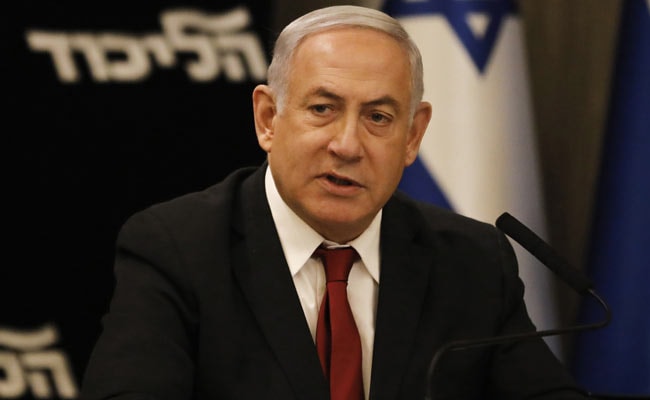
Benjamin Netanyahu said Israel does not “seek to govern Gaza.” (File)
Palestinian Territories:
Israel has agreed pauses in its offensive in northern Gaza that will allow some civilians to flee heavy fighting, but Prime Minister Benjamin Netanyahu ruled out any broader ceasefire as a “surrender” to Hamas.
US President Joe Biden welcomed the pauses, which formalise an arrangement that has already seen tens of thousands of Palestinians flee devastation in northern Gaza, but also said there was “no possibility” of a ceasefire.
Netanyahu said Israeli troops were performing “exceptionally well” in the offensive launched after Hamas fighters poured across the border on October 7, killing 1,400 people, mostly civilians, and taking around 240 hostage.
Vowing to destroy Hamas, Israel retaliated with an aerial bombing and ground offensive that the health ministry in the Hamas-run Gaza Strip says has killed more than 10,800 people, mostly civilians and many of them children.
Netanyahu said Israel does not “seek to govern Gaza.”
“We don’t seek to occupy it, but we seek to give it and us a better future,” he told Fox News.
Tens of thousands of civilians have streamed out of devastated northern Gaza in recent days, with men, women and children clutching meagre possessions as they emerge from the devastated warzone.
They have fled close-quarter fighting, with Hamas operatives using rocket-propelled grenades against Israeli troops backed by armoured vehicles and heavy airstrikes.
The Israeli army said it struck a shipping container on the Gaza coast that contained rocket launchers, while Hamas’s military wing said it had fired rockets at Re’im military base in southern Israel.
The UN agency responsible for Palestinian refugees, UNRWA, said 70,000 people had travelled south on the route since November 4, most of them walking.
Almost 1.6 million people have been internally displaced since October 7, it added, more than half the area’s population.
But the UN estimates hundreds of thousands of civilians remain in the fiercest battle zones in the north.
And while Biden welcomed the pauses as a “step in the right direction”, there was little hope for the broader halt to fighting that aid groups and the UN say is desperately needed.
“A ceasefire with Hamas means surrender to Hamas, surrender to terror,” Netanyahu told Fox.
“There won’t be a ceasefire without the release of Israeli hostages, that’s not going to happen.”
– ‘Most tragic situation’ –
Aid groups have pleaded for a ceasefire, warning of a humanitarian “catastrophe” in Gaza, where food, water and medicine are in short supply.
“It’s the first thing I think about when I wake up: how am I going to feed the children today,” Amal al-Robayaa told AFP in Rafah, where she was sheltering with her husband, six children, daughter-in-law and two grandchildren at a UN school.
Oxfam France director Cecile Duflot said staff were reporting “the worst, the most tragic situation that they have ever seen” in the territory.
Overnight, fierce clashes continued, and Hamas-run local authorities accused Israel of shelling the areas of several hospitals in northern Gaza.
The Al-Shifa hospital, where an estimated 60,000 people have taken refuge, along with the Rantisi children’s hospital and the Indonesian hospital all came under fire overnight, Hamas authorities said.
The bombardments caused injuries but no deaths, they added.
Israel has accused Hamas of using hospitals including Al-Shifa to hide its military operations. The Israeli military did not immediately respond to a request for comment on the alleged bombardments.
Complicating Israel’s military push is the fate of around 240 hostages abducted on October 7.
CIA director Bill Burns and David Barnea, head of Israel’s Mossad spy agency, were in Doha for talks on pauses that would include hostage releases and more aid for Gaza, an official told AFP.
– ‘Everything stopped’ –
Palestinian group Islamic Jihad released a video Thursday claiming to show two hostages — a woman in her 70s and a 13-year-old boy — which, if verified, would suggest not all captives are held by Hamas.
Israel’s military slammed the video as “psychological terrorism”.
Four hostages have been freed so far, and the desperate relatives of those still held have piled pressure on Israeli and US authorities to secure the release of their loved ones.
“We don’t sleep well. We don’t eat well,” Ronen Neutra, whose son Omer is being held hostage, told AFP in an interview.
“Everything stopped.”
Inside Gaza, the intense combat and effective blockade of the densely populated territory have led to increasingly dire conditions.
Donors at an aid conference in Paris have pledged around $1.1 billion, but access to Gaza remains very limited, with around 100 trucks a day able to enter, far below the pre-war average.
“In our most conservative scenario, this conflict is likely to set back development (in the Palestinian territories) by well over a decade,” UNDP administrator Achim Steiner told AFP.
Israeli officials however insist there is “no humanitarian crisis” in Gaza.
Violence has surged in the occupied West Bank since the conflict erupted, with at least 14 Palestinians killed on Thursday alone, according to the Ramallah-based health ministry.
The conflict has also stoked regional tensions, with cross-border exchanges between the Israeli army and Lebanon’s Hezbollah, and Yemen’s Iran-backed Huthi rebels saying they launched “ballistic missiles” at southern Israel.
A drone hit a school in southern Israel’s Eilat on Thursday and Israeli air defences later intercepted a missile over the Red Sea, the military said.
On Friday, the military said it struck the source of the drone, in Syrian territory.
It did not identify the organisation behind the drone, but said it “holds the Syrian regime fully responsible for every terror activity emanating from its territory.”
(Except for the headline, this story has not been edited by NDTV staff and is published from a syndicated feed.)




